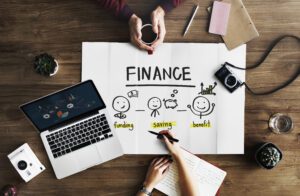PERSONAL FINANCE:

Personal finance refers to the management of an individual’s or family’s financial resources it includes financial decisions, savings, budgeting, investing and future’s planning of expenses. The goal of personal finance is to be optimize of financial resources to be meet current and future financial needs and objectives. The main aim of personal finance is to make thoughtful and informed decisions about money to achieve financial goals, whether short-term (like saving for a vacation) or long-term (like funding a comfortable retirement). It involves assessing your current financial situation, setting realistic and achievable goals, and implementing strategies to manage your money effectively. By practicing good personal finance habits, individuals can work towards financial stability, security, and the realization of their financial objectives.
AREAS OF PERSONAL FINANCE;
The five areas of personal finance that is income, saving, spending, investing and protection.
A. Income:
The first area of personal finance is income means that money you receive. Understanding and managing the money you earn from various sources, such as employment, investments, or side businesses.
B. Saving:
The second area of personal finance is saving. Saving is very important in our daily life because saving is a basic need for every investor to grow money. It should main motive for larger expenses or emergencies. In short it means not using all your income you have to be in saving for at least 6 months to cover emergencies.
C. Spending:
Spending means outflow of cash from pocket. This includes rent, mortgages, groceries, petrol, clothes, and travel or many more. You have to be spending on things within limit of your income if go beyond that then you have in trouble.
D. Investing:
Investing means grow your money by multiple times by purchasing assets ( includes stocks, bonds, mutual funds, land) on assets we earn returns in the form of money. Investing plays very important role in our personal finance.
E. Protection:
This is the last area of personal finance is protection. Protection means people take care of themselves from unexpected events like illness accident, or chronic disease by using of saving money.
HOW TO MAINTAIN PERSONAL FINANCE-

Maintaining personal finance involves managing your income, expenses, saving, and investments to achieve financial goals and ensure financial stability. Here are some steps to help you mange your personal finance effectively.
1 SET FINANCIAL GOALS:
- Define short term, medium term and long rem financial goals.
- Examples includes building an emergency fund, paying off debt, saving for a home or investments for retirement.
2 CREATE A BUDGET:
- Track your income and expenses to understand where your money is going.
- Categorize expenses as fixed like rent and utilities and variable like groceries and entertainment.
3 Emergency fund:
- Save at least 3 to 6 months worth of living expenses in an easily accessible account.
4 Manage debt:
- Prioritize paying off high interest debt first. Consider consolidating or refinancing loans to lower interest rates.
5 Save and Invest:
- Save a portion of your income regularly. Start with a small percentage and gradually increase it.
- Diversify your investment based on your risk tolerance and financial goals.
- Consider retirement account.
6 Insurance:
- Review and update your insurance coverage regularly, including health, life and property insurance.
7 Review and Adjust:
- Periodically review your budget and financial goals.
- Adjust your budget as needed especially if there are changes in income, expenses or financial goals.
8 Educate yourself:
- Stay informed about personal finance topics, investment options and financial planning strategies.
9 Negotiable and Shop Smart:
- Negotiable bills interest rates and prices whenever possible.
- Compare prices and look for discounts before making significant purchases.
10 Plan for retirement:
- Contribute consistently to retirement accounts.
- Consider consulting a financial advisors to help plan for retirement and maximize saving.
Why personal finance is important;
Personal finance is crucial for several reasons because it immediately affects a person’s lifestyle, long-term objectives, and financial security. First of all, good personal finance enables people to set aside money for their needs and goals, budget sensibly, and manage their income. By offering a structure for investments, emergency money, and savings, it promotes financial stability by ensuring people are better equipped to handle unforeseen costs or reach long-term financial objectives.
Furthermore, attaining financial objectives like home ownership, college funding, and retirement savings depend on personal finance. It assists people in matching their financial habits with their goals by assisting them in making well-informed decisions about their spending, saving, and investing. Furthermore, having a solid foundation in personal finance helps people feel more secure and at ease financially, which lowers stress and anxiety associated with money-related issues.
Developing creditworthiness also heavily depends on having a solid understanding of personal finance. A strong credit history is essential for getting loans and advantageous interest rates when needed. This can be achieved by responsible financial management, which includes paying bills on time and using credit responsibly.
Additionally, a personal finance education gives people the skills they need to understand complicated financial products and make wise decisions about retirement planning, investments, and insurance. It increases financial literacy, empowering people to make decisions that are consistent with their goals and values.
Summary;
Personal finance encompasses the comprehensive management of an individual’s financial resources and decisions, playing a pivotal role in shaping financial well-being.It entails preparing for future objectives including homeownership, education, and retirement as well as budgeting, saving, and investing. Achieving financial stability requires effective personal finance since it helps people to save and spend money sensibly, accumulate emergency savings, and manage their resources. Personal finance also lessens the stress that comes with money-related issues by fostering a sense of financial security. It entails developing financial literacy, managing credit responsibly, and making educated decisions regarding a range of financial products. In the end, personal finance gives people the ability to take charge of their financial destiny by enabling them to match their financial practices with their goals of living a safe and contented life.
